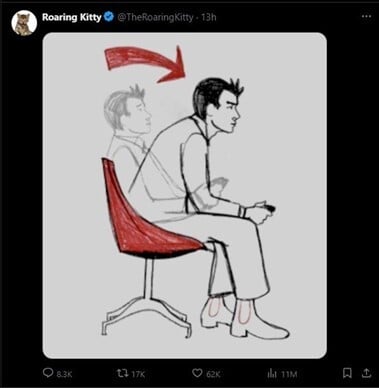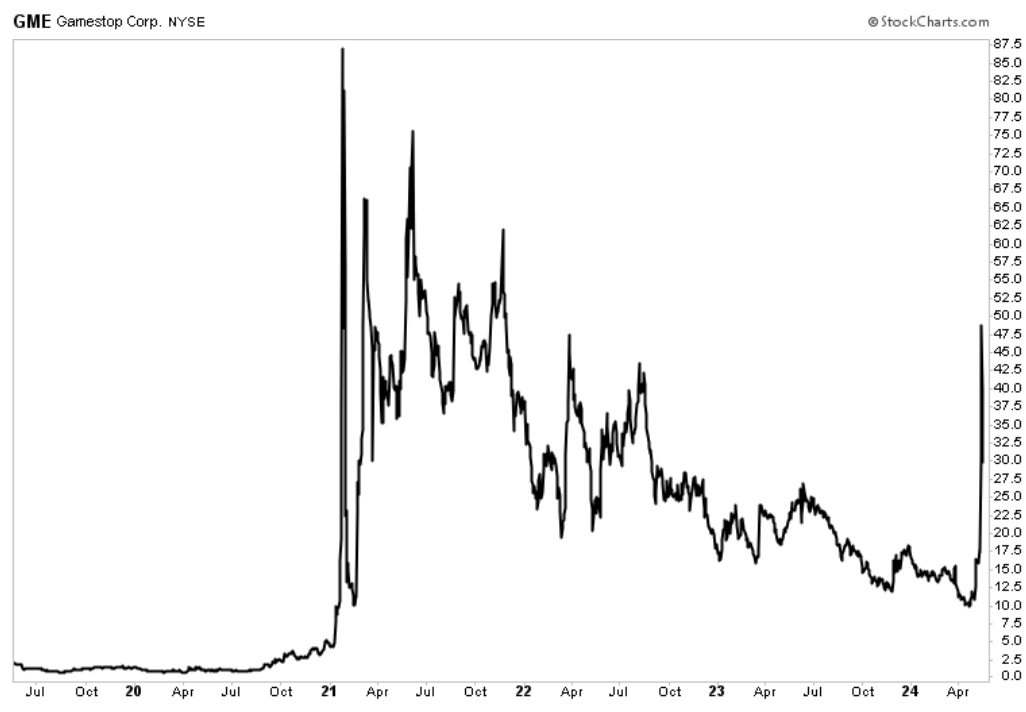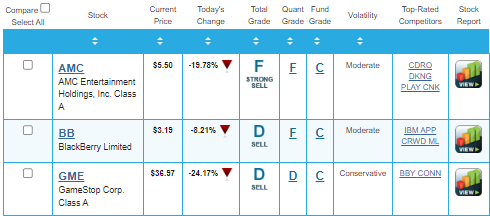Forget About GameStop (GME) and Other “Meme Stocks” Dear Reader, After nearly three years of silence, the man who kicked off the “meme stock” craze, Keith Gill (better known as “Roaring Kitty”) is back at it again.
If you’ve looked at the market earlier this week, then you know that GameStop Corp. (GME) is trending in the news again. That’s because on Sunday night at exactly 8:00 pm Eastern time, “Roaring Kitty” broke his nearly three-year-long silence on social media.
The post, made on X (formerly Twitter), was a simple drawing. Gill offered up no other explanation. In fact, as you can see below, he offered no words at all. Instead, he let the meme speak for itself.  The image is a meme used by gamers to highlight when things are getting serious. This post alone was enough to send shares of GameStop soaring 74% on Monday. This is the biggest intraday trading jump for GameStop since the meme stock craze began in 2021. And the strength continued into Tuesday, with the stock up another 60%.
Now, I realize some of you may be asking yourselves who exactly this Roaring Kitty character is anyway. So, in today’s Market 360 , let’s take a trip down memory lane, back to 2021 when the meme stock craze was in full force. Then, we’ll go over what sparked the resurgence in these stocks this week and why I firmly believe investors should steer clear. And finally, I’ll also explain how you can find stocks that should profit without all the unnecessary hype... Origins of the Meme Stock Mania At the start of 2021, GameStop was a struggling video game retailer. The company’s brick-and-mortar approach to selling video games was behind the times in the age of streaming. The company was already closing many of its storefronts, and the share price was on a steady decline. When the pandemic came along, things only got worse.
Then, suddenly, on January 13, 2021, something strange happened.
Shares of GME drastically increased in price. They rose as high as 93% that day and continued to trend higher for some time. The stock would go on to see absolutely wild swings throughout much of 2021, and into 2022. You can see for yourself in the chart below.  It was all because of Gill (aka Roaring Kitty) and a host of other speculators who congregated on the popular Reddit forum, r/WallStreetBets. As it turns out, Gill and other individuals had been chatting about what they perceived as GameStop’s undervaluation and strong cash position – a view not shared by seasoned Wall Street analysts.
He and others also noticed that shares in GameStop were dangerously shorted. At one point, more than 138% of the company’s tradable shares had been borrowed and sold short, according to CNBC. This made the stock the most shorted on the U.S. stock market, according to FactSet.
So, these rogue traders got together and began buying the stock to engineer what’s known as a “short squeeze”.
Simply put, when traders “short” a stock, they borrow shares of the stock they think will fall over a given timeframe. If the stock drops, they give back the shares and collect the difference between the initial borrowed price and the actual sale price.
But when a trade goes against them, short sellers start to close their positions to limit losses, meaning they start buying shares in the company. However, a sudden surge of rapid buying from short sellers ends up increasing the price of the shares – thus, the “squeeze” part.
This strategy worked for a time. In fact, these rogue traders practically ran one hedge fund, Melvin Capital, out of business. The episode cost the fund around $6.8 billion, more than half the firm's assets under management.
Gill, meanwhile, initially had a stake worth $53,000. And although we don’t really know how much he made ultimately, at one point, his position was worth more than $50 million. What’s Happening Now Now, the meme stock craze eventually fizzled out. And if you recall, it wasn't just GameStop caught up in the frenzy. Many other low-quality stocks rocketed higher, too - AMC Entertainment Holdings, Inc. (AMC), BlackBerry Ltd. (BB) and Bed Bath and Beyond, to name a few.
Flash forward to the present day, and Roaring Kitty is back, with shares of GME running away again.
I couldn’t tell you why a simple sketch pushed GME and other meme stocks higher when Gill didn’t mention any of these in any of his posts over the past few days. And to be perfectly frank with you, I find this meme-mania bizarre.
But I’ve been in this business for nearly four decades now, and I’ve seen behavior like this before. So, it’s actually pretty easy to understand.
For example, let’s say I think you are going to react to the cryptic “Roaring Kitty” post by buying GameStop. And you think I’m going to react by doing the same… Well, we are both going to be tripping over each other trying to buy the shares first.
Is it irrational? Of course it is, but Wall Street is a manic crowd that likes to react first and think later. But by doing this, investors are losing sight of the fundamentals of these companies and just trying to beat “the other guys” to the punch.
This time, however, the meme-mania may be short-lived. A lot of these stocks are already falling back to earth, reversing the major gains in the first half of the week.
In fact, as of this writing, shares of GME have tumbled 57%, shares of AMC have fallen 61% and shares of BB are now down 21% from their highs this week. Bottom Line on GME Stock During times like this, investors tend to care less about a stock’s fundamentals and more about getting in before everyone else does. So, I can understand why you may feel tempted to join the party.
But I would be remiss if I didn’t tell you that this is a dangerous game, and it likely won’t end well for these stocks over the longer term.
Just take a look at my Portfolio Grader report card below. Both GameStop and BlackBerry hold D-ratings making them “Sells” while AMC holds an F-rating making it a “Strong Sell”. Those following my Portfolio Grader would have known to skip the hype this week.  The fact is meme trading is solely based on social media buzz. That’s not the smartest way to pick your investments. There is just no good way to model it or to predict when the party’s over. And that is why it is essential to invest in fundamentally superior stocks.
The bottom line is that I look for stocks with superior fundamentals across the board. And the fact is stocks like GME, AMC and BB don’t fit the bill. Another Group of Stocks to Avoid... If you stick with stocks that have strong earnings and sales growth, you’re much less likely to be the one left holding the bag when the feeding frenzy fades.
But you might be surprised to learn that it’s not just meme stocks that you should avoid...
In fact, I’m growing deeply worried that folks are falling into the same trap with AI stocks that they fell into during the dot-com boom of the 1990s...
Back in the 1990s, Wall Street and the mainstream media told us that the Internet was such a game-changing technology that the old rules about valuing stocks had to be thrown out the window.
I'm here to tell you that we are seeing the same situation play out with AI.
And just like meme stocks in 2021 (or tech stocks in the late 90s), I predict that the speculative frenzy around AI is going to come crashing down just like every frenzy before it. And when that crash happens… folks invested in the wrong AI stocks will be left holding the bag.
I don’t want you to be caught off guard when this crash happens. That’s why I’m issuing an urgent warning about the AI “losers,” that won’t survive – and how you can find the AI trophy stocks that can become the cornerstone of your portfolio for the next decade.
Go here to learn more about my shocking bearish AI prediction right now.
(Already a Growth Investor subscriber? Click here to log in to the members-only website now.)
Sincerely, |
No comments:
Post a Comment